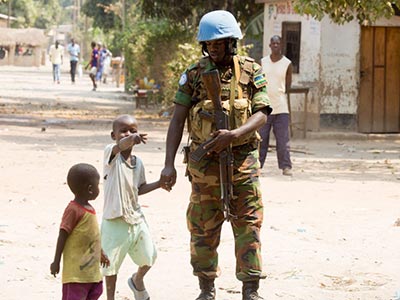Protection of Civilians Course – POC23-2
Peace and Security Studies

Course Fee: All expenses are covered by the KAIPTC. The course is fully sponsored by the Government of Switzerland. Tuition, air travel from and to the nearest international airport, visa fees, food and accommodation will be provided by the KAIPTC. However, participants will have to bear the cost for their private travel and health insurance.
Terms and Conditions:
• The course is conducted in English only. There will be no interpretation in other languages. • In case of an overwhelming number of applications, priority will be given to applicants from the ECOWAS region, from the field missions and those who have not attended fully sponsored courses at KAIPTC within the last two years. • In case of selection, you will be asked to complete a POC e-learning module of the Peace Operations Training Institute (POTI) prior to the beginning of the course. The issued e-certificate is a requirement for your final certification of the POC23-2 course (10 to 15 hours of self-study). • All participants are to travel with a travel medical insurance covering incl. COVID-19 treatment, and must be valid for additional two weeks after course end date. The KAIPTC and the Swiss Government do NOT accept any responsibility for medical treatment and travel or other insurance.

| In short | |
| Course Date/Duration | 13 – 24 November 2023 (two weeks) |
| Course Capacity | 30 participants |
| Target Group | Civilian, Police and Military personnel (see details below) |
| Course Language | English |
| Application Deadline | 13 September 2023 |
Background
The changing nature of armed conflicts has resulted in an increased civilian-combatant interface, to the extent that contemporary conflicts have been referred to as ‘wars among the people’. Civilian populations bear the greatest brunt of today’s complex and intractable conflicts. This changing nature of conflicts has necessitated both doctrinal and operational shifts in peace operations.
Protection of Civilians has increasingly become an integral component of contemporary peace operations. Emerging international support to the ‘Responsibility to Protect’ norm notwithstanding, peacekeepers and other actors involved in peace support operations are often not adequately prepared or trained to deal with the daunting task of protecting civilians.
Course Aim
The aim of the POC23-2 course is to enhance the capacity of participants for the effective implementation of POC mandates in Peace Operations, in order to mitigate the effects of conflicts on civilians.
The course is certified by United Nations Department for Peace Operations.
Target Group
The target group mainly includes military, police and civilian personnel who are currently deployed or could be deployed in UN, AU or ECOWAS peace operations at operational level. (For military officers: Maj, Lt Col, Col or equivalent; for police officers: ASP to CSUPT or equivalent; for civilian staff: P3 to P5, or equivalent).
- UN/AU/RECs Staff,
- Mission personnel,
- Military & Police personnel,
- Humanitarian Actors,
- Government officials,
- Non-Governmental Organizations,
- Civil Society Organizations.
We strive for an equal participation of Military, Police and Civilians as well as gender balance.
Objectives
On completion of this course, participants will:
- Know the key concepts of protection of civilians (POC), child protection (CP), and conflict-related sexual violence (CRSV) in Peace Operations,
- Understand the role of different protection actors,
- Understand the relevance of the core legal concepts and norms supporting POC,
- Identify POC strategies at all level and understand the process of planning at the tactical level,
- Know how to translate conceptual and legal frameworks of POC into appropriate action at the tactical level.
Course Content
The POC23-2 course combines theoretical and practical sessions on the following modules:
- Introduction to POC,
- UN and AU Approaches to POC,
- Legal Framework of POC,
- POC and its Interlinkages to SSR, R2P and Terrorism,
- Gender and POC,
- Decision Making and Planning,
- POC in Practice (incl. Exercise “CARANA”).
Teaching Method
The course will be delivered through a combination of lectures, case studies, small group works and exercises. The “Collaborative Problem-Based Learning Approach” will be used in the delivery of the course: participants will play an active role under the guidance of an experienced team of facilitators.
How to Apply
Interested applicants are requested to kindly fill and submit an online application form not later than 13 September 2023.
Access the application by pressing the “How to Apply” button.
The course usually attracts a lot of interest. A selection committee decides on the final admission to the course latest by 22 September 2023.
Contact at KAIPTC
| For course content issues |
| Maj Thuruban Thuchchathanan
Swiss Armed Forces Course Director POC23-2 Office: +233 (0) 302 71 82 00 Ext. 1315 Cell: +233 (0) 54 042 9255 |

